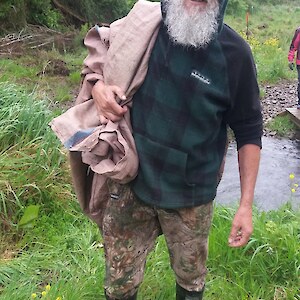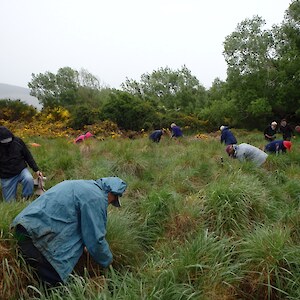2018 SERN Spring Field Trip
Another interesting day in the field enjoyed by the 28 participants. We started with a short stop at Dave Milligan Park, where we were joined by Graham Milligan who gave us a brief history of the area. Native plantings had been undertaken there by Rural Women (commemorating 100 years of Women’s Suffrage, 25 years prior), the Men of the Trees group and Southland Farm Forestry. These plantings are left to do their own thing now and are looking well established.
At the Rural Womens Wetland we were greeted by Jesse Bythell, who optomistically suggested our raincoats wouldn’t be needed as the sun was shining and it looked a lovely day. Jesse has been involved with the wetland in her capacity as QEII National Trust Southland Representative, as the Rural Women have placed an Open Space Covenant over the area. We broke in to two groups, with one lot exploring the northern wetland, while the second troop set off south to plant 50 cabbage trees in a more open area near the bottom pond. These trees form a part of another Rural Women commemorative plot, this time celebrating 125 years of Women’s Suffrage, with the intention of planting a cabbage tree for each one of those years. This will be an impressive sight in years to come, and is most apt when you think that the pine forest here was originally planted with pines propagated in the early WDFF lady’s gardens and planted by them on the hillslopes above this wetland. As the last trees went in the rain fell to ensure they got off to a good start.
In the comfort and warm of the Mossburn Community Centre we had our lunch and dried off. This was followed by a report from the different groups in attendance on the work that had been going on in their areas. Ali Meade, Biosecurity & Biodiversity Operations Manager, Environment Southland gave an update on what was happening in the biodiversity field and introduced the new Environment Southland Biodiversity Programme Leader, Mark Oster.
Richard Bowman, trustee for the Mid Dome Wilding Pines Trust, then gave a presentation on the historic background and present work being undertaken. Richard has a vast knowledge of this work, as well as the national wilding pine programme, being involved as Biosecurity Manager for Environment Southland for many years until his retirement last autumn.
We then headed up to Five Rivers Cafe, where Richard described further the work that has been undertaken, costing millions of dollars. Interestingly he also pointed out that work had been done in the Eyre Mountains on wilding pines as well, however it was carried out when the problem was in the early stages and so has been much easier to get under control. He also commented on the danger of douglas fir being another wilding problem, as the seeds of that species is very light and has potential to be wind spread some distance.
As we travelled Jesse gave a commentary on the ecological districts and some of their botanical features, while Brian Rance also added snippets here and there.
A very informative day and thanks go to the Rural Women and Dipton Landcare Group for hosting us at the Castledowns Wetland and to Richard Bowman for his presentation on behalf of the Mid Dome Wilding Pines Trust. Thanks to those who helped with their commentaries along the way. Also a big thanks to Environment Southland for sponsoring the bus cost for the day.









